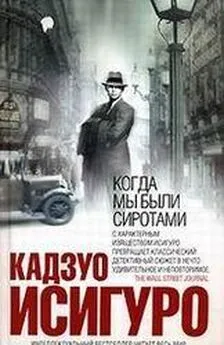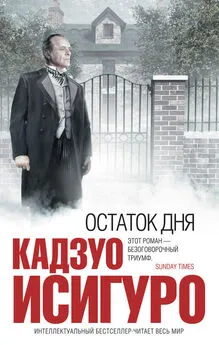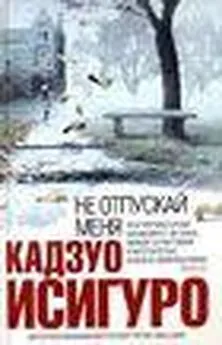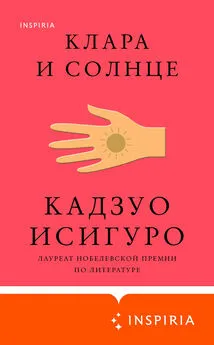Кадзуо Исигуро - Остаток дня / The Remains of the Day
- Название:Остаток дня / The Remains of the Day
- Автор:
- Жанр:
- Издательство:неизвестно
- Год:2020
- Город:Москва
- ISBN:978-5-04-112761-9
- Рейтинг:
- Избранное:Добавить в избранное
-
Отзывы:
-
Ваша оценка:
Кадзуо Исигуро - Остаток дня / The Remains of the Day краткое содержание
«Остаток дня» – дневник дворецкого, жизнь с точки зрения Бэрримора. В основе его стилистики лежит сдержанность, выявляющая себя в самой механике речи. Герой не считает возможным проявлять свои чувства, и на лингвистическом уровне эта своеобразная аскеза приводит к замечательным результатам – перед нами этакая оборотная сторона Достоевского с его неуправляемым потоком эмоций.
В 1989 году за «Остаток дня» Исигуро единогласно получил Букера (и это было, пожалуй, единственное решение Букеровского комитета за всю историю премии, ни у кого не вызвавшее протеста). Одноименная экранизация Джеймса Айвори с Энтони Хопкинсом в главной роли пользовалась большим успехом.
А Борис Акунин написал своего рода римейк «Остатка дня» – роман «Коронация».
В формате a4-pdf сохранен издательский макет книги.
Остаток дня / The Remains of the Day - читать онлайн бесплатно ознакомительный отрывок
Интервал:
Закладка:
‘Mr Stevens, that is the incorrect Chinaman, would you not agree?’
‘Miss Kenton, I am very busy. I am surprised you have nothing better to do than stand in corridors all day.’
‘Mr Stevens, is that the correct Chinaman or is it not?’
‘Miss Kenton, I would ask you to keep your voice down.’
‘And I would ask you, Mr Stevens, to turn around and look at that Chinaman.’
‘Miss Kenton, please keep your voice down. What would employees below think to hear us shouting at the top of our voices about what is and what is not the correct Chinaman?’
‘The fact is, Mr Stevens, all the Chinamen in this house have been dirty for some time! And now, they are in incorrect positions!’
‘Miss Kenton, you are being quite ridiculous. Now if you will be so good as to let me pass.’
‘Mr Stevens, will you kindly look at the Chinaman behind you?’
‘If it is so important to you, Miss Kenton, I will allow that the Chinaman behind me may well be incorrectly situated. But I must say I am at some loss as to why you should be so concerned with these most trivial of errors.’
‘These errors may be trivial in themselves, Mr Stevens, but you must yourself realize their larger significance.’
‘Miss Kenton, I do not understand you. Now if you would kindly allow me to pass.’
The fact is, Mr Stevens, your father is entrusted with far more than a man of his age can cope with.’
‘Miss Kenton, you clearly have little idea of what you are suggesting.’
‘Whatever your father was once, Mr Stevens, his powers are now greatly diminished. This is what these “trivial errors” as you call them really signify and if you do not heed them, it will not be long before your father commits an error of major proportions.’
‘Miss Kenton, you are merely making yourself look foolish.’
‘I am sorry, Mr Stevens, but I must go on. I believe there are many duties your father should now be relieved of. He should not, for one, be asked to go on carrying heavily laden trays. The way his hands tremble as he carries them into dinner is nothing short of alarming. It is surely only a matter of time before a tray falls from his hands on to a lady or gentleman’s lap. And furthermore, Mr Stevens, and I am very sorry to say this, I have noticed your father’s nose.’
‘Have you indeed, Miss Kenton?’
‘I regret to say I have, Mr Stevens. The evening before last I watched your father proceeding very slowly towards the dining room with his tray, and I am afraid I observed clearly a large drop on the end of his nose dangling over the soup bowls. I would not have thought such a style of waiting a great stimulant to appetite.’
But now that I think further about it, I am not sure Miss Kenton spoke quite so boldly that day. We did, of course, over the years of working closely together come to have some very frank exchanges, but the afternoon I am recalling was still early in our relationship and I cannot see even Miss Kenton having been so forward. I am not sure she could actually have gone so far as to say things like: ‘these errors may be trivial in themselves, but you must yourself realize their larger significance’. In fact, now that I come to think of it, I have a feeling it may have been Lord Darlington himself who made that particular remark to me that time he called me into his study some two months after that exchange with Miss Kenton outside the billiard room. By that time, the situation as regards my father had changed significantly following his fall.
The study doors are those that face one as one comes down the great staircase. There is outside the study today a glass cabinet displaying various of Mr Farraday’s ornaments, but throughout Lord Darlington’s days, there stood at that spot a bookshelf containing many volumes of encyclopedia, including a complete set of the Britannica. It was a ploy of Lord Darlington’s to stand at this shelf studying the spines of the encyclopedias as I came down the staircase, and sometimes, to increase the effect of an accidental meeting, he would actually pull out a volume and pretend to be engrossed as I completed my descent. Then, as I passed him, he would say:
‘Oh, Stevens, there was something I meant to say to you.’
And with that, he would wander back into his study, to all appearances still thoroughly engrossed in the volume held open in his hands. It was invariably embarrassment at what he was about to impart which made Lord Darlington adopt such an approach, and even once the study door was closed behind us, he would often stand by the window and make a show of consulting the encyclopedia throughout our conversation.
What I am now describing, incidentally, is one of many instances I could relate to you to underline Lord Darlington’s essentially shy and modest nature. A great deal of nonsense has been spoken and written in recent years concerning his lordship and the prominent role he came to play in great affairs, and some utterly ignorant reports have had it that he was motivated by egotism or else arrogance. Let me say here that nothing could be further from the truth. It was completely contrary to Lord Darlington’s natural tendencies to take such public stances as he came to do and I can say with conviction that his lordship was persuaded to overcome his more retiring side only through a deep sense of moral duty. Whatever may be said about his lordship these days – and the great majority of it is, as I say, utter nonsense – I can declare that he was a truly good man at heart, a gentleman through and through, and one I am today proud to have given my best years of service to.
On the particular afternoon to which I am referring, his lordship would still have been in his mid-fifties; but as I recall, his hair had greyed entirely and his tall slender figure already bore signs of the stoop that was to become so pronounced in his last years. He barely glanced up from his volume as he asked.
‘Your father feeling better now, Stevens?’
‘I’m glad to say he has made a full recovery, sir.
’
‘Jolly pleased to hear that. Jolly pleased.’
‘Thank you, sir.’
‘Look here, Stevens, have there been any – well – signs at all? I mean signs to tell us your father may be wishing his burden lightened somewhat? Apart from this business of him falling, I mean.’
‘As I say, sir, my father appears to have made a full recovery and I believe he is still a person of considerable dependability. It is true one or two errors have been noticeable recently in the discharging of his duties, but these are in every case very trivial in nature.’
‘But none of us wish to see anything of that sort happen ever again, do we? I mean, your father collapsing and all that.’
‘Indeed not, sir.’
‘And of course, if it can happen out on the lawn, it could happen anywhere. And at any time.’
‘Yes, sir.’
‘It could happen, say, during dinner while your father was waiting at table.’
‘It is possible, sir.’
‘Look here, Stevens, the first of the delegates will be arriving here in less than a fortnight.’
‘We are well prepared, sir.’
‘What happens within this house after that may have considerable repercussions.’
‘Yes, sir.’
‘I mean considerable repercussions. On the whole course Europe is taking. In view of the persons who will be present, I do not think I exaggerate.’
‘No, sir.’
‘Hardly the time for taking on avoidable hazards.’
‘Indeed not, sir.’
‘Look here, Stevens, there’s no question of your father leaving us. You’re simply being asked to reconsider his duties.’
And it was then, I believe, that his lordship said as he looked down again into his volume and awkwardly fingered an entry:
‘These errors may be trivial in themselves, Stevens, but you must yourself realize their larger significance. Your father’s days of dependability are now passing. He must not be asked to perform tasks in any area where an error might jeopardize the success of our forthcoming conference.’
‘Indeed not, sir. I fully understand.’
‘Good. I’ll leave you to think about it then, Stevens.’
Lord Darlington, I should say, had actually witnessed my father’s fall of a week or so earlier. His lordship had been entertaining two guests, a young lady and gentleman, in the summerhouse, and had watched my father’s approach across the lawn bearing a much welcome tray of refreshments. The lawn climbs a slope several yards in front of the summerhouse, and in those days, as today, four flagstones embedded into the grass served as steps by which to negotiate this climb. It was in the vicinity of these steps that my father fell, scattering the load on his tray – teapot, cups, saucers, sandwiches, cakes – across the area of grass at the top of the steps. By the time I had received the alarm and gone out, his lordship and his guests had laid my father on his side, a cushion and a rug from the summerhouse serving as pillow and blanket. My father was unconscious and his face looked an oddly grey colour. Dr Meredith had already been sent for, but his lordship was of the view that my father should be moved out of the sun before the doctor’s arrival; consequently, a bath-chair arrived and with not a little difficulty, my father was transported into the house. By the time Dr Meredith arrived, he had revived considerably and the doctor soon left again, making only vague statements to the effect that my father had perhaps been ‘Over-working’.
The whole episode was clearly a great embarrassment to my father, and by the time of that conversation in Lord Darlington’s study, he had long since returned to busying himself as much as ever. The question of how one could broach the topic of reducing his responsibilities was not, then, an easy one. My difficulty was further compounded by the fact that for some years my father and I had tended – for some reason I have never really fathomed – to converse less and less. So much so that after his arrival at Darlington Hall, even the brief exchanges necessary to communicate information relating to work took place in an atmosphere of mutual embarrassment.
In the end, I judged the best option to be to talk in the privacy of his room, thus giving him the opportunity to ponder his new situation in solitude once I took my leave. The only times my father could be found in his room were first thing in the morning and last thing at night. Choosing the former, I climbed up to his small attic room at the top of the servants’ wing early one morning and knocked gently.
I had rarely had reason to enter my father’s room prior to this occasion and I was newly struck by the smallness and starkness of it. Indeed, I recall my impression at the time was of having stepped into a prison cell, but then this might have had as much to do with the pale early light as with the size of the room or the bareness of its walls. For my father had opened his curtains and was sitting, shaved and in full uniform, on the edge of his bed from where evidently he had been watching the sky turn to dawn. At least one assumed he had been watching the sky, there being little else to view from his small window other than roof-tiles and guttering. The oil lamp beside his bed had been extinguished, and when I saw my father glance disapprovingly at the lamp I had brought to guide me up the rickety staircase, I quickly lowered the wick. Having done this, I noticed all the more the effect of the pale light coming into the room and the way it lit up the edges of my father’s craggy, lined, still awesome features.
‘Ah,’ I said, and gave a short laugh, ‘I might have known Father would be up and ready for the day.’
Читать дальшеИнтервал:
Закладка:
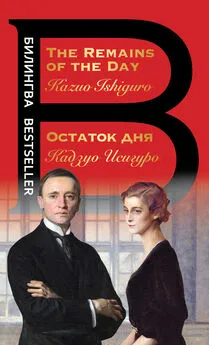
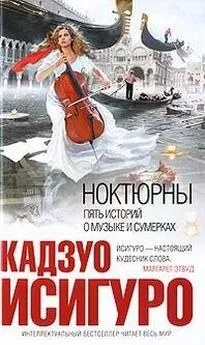
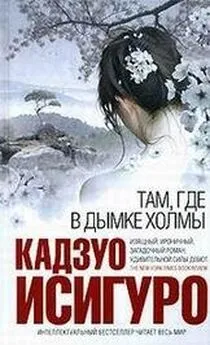
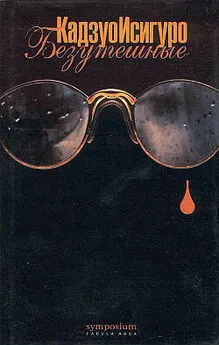

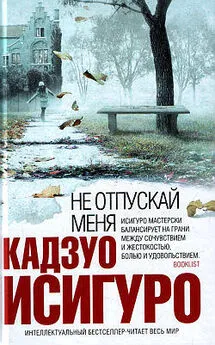
![Кадзуо Исигуро - Не отпускай меня [litres]](/books/1095846/kadzuo-isiguro-ne-otpuskaj-menya-litres.webp)
